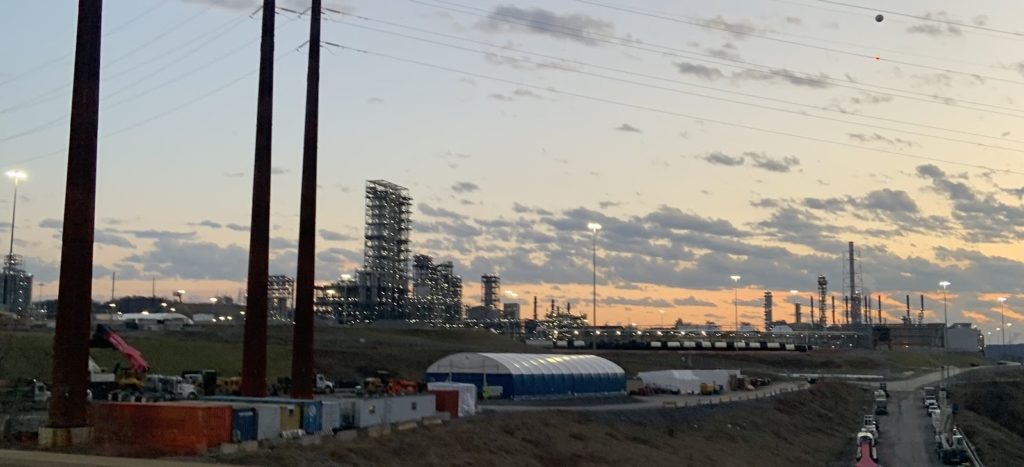The people of Beaver, Pennsylvania, were alarmed to see huge billows of smoke and fire coming out of the Shell ethylene cracker plant on Feb. 13. Just 10 days earlier, 30 minutes down the road in East Palestine, Ohio, a train had derailed and been set aflame, leaching chemicals into the Ohio River that flows past Beaver and blanketing the town in ash and smoke.
The explosions of flame coming from the Shell plant are part of a process that sounds, and is treated by natural gas corporations, as innocuous. Called “flaring,” natural gas processing plants light escaping gases on fire, turning smokestacks into towers of flame. Flaring burns unprocessed hydrocarbons in order to prevent their entering the atmosphere. However, flaring does not burn off all of the hydrocarbons that are being released, and can in fact create new, sometimes more dangerous compounds, as well as creating huge clouds of toxic black smoke and occasionally acid rain.
According to Shell, a “situation” at the Beaver cracker plant precipitated “heightened flaring.” In response to criticism, Shell said that “the primary purpose of the flares is to enable a safe response to equipment malfunctions, and the system is working as designed.”
The Shell cracker plant, which only began operations in November 2022, has already been issued a violation notice by the Pennsylvania Department of Environmental Protection for exceeding its rolling 12 month emissions limit in just two months of operations. It has been issued ten notices of violation, eight of them related to air quality.
The plant emitted 741.5 tons of volatile organic compounds, including benzene, and 345.4 tons of nitrogen oxides. These chemicals cause respiratory illnesses and skin irritation. High levels of VOC exposure causes organ damage, cancer and nervous system damage. These chemicals when combined can react to form ground level ozone, creating unhealthy air quality.
Beaver County is in western Pennsylvania, a part of the “rust belt” that was once home to much of the manufacturing and union activity in the United States. This area is now home to one of the highest cancer rates in the country.
What is a cracker plant and how is it related to fracking?

A cracker plant is just one step in the process of “fracking,” a dangerous process that grossly pollutes at every stage. An ethane cracker plant is a large industrial facility that takes ethane and processes, or “cracks,” it into ethylene. It heats the ethane up so hot that it breaks apart the molecular bonds holding it together. Ethylene is the root chemical and building block for plastics, resins, adhesives and other chemicals. The Shell Chemical Appalachia plant in Beaver County plans to produce 1.6 million metric tons of polyethylene plastic pellets, known as nurdles, each year.
Before the ethane reaches the cracker plant in Beaver County, it comes from the local Marcellus Shale rock formation, where drilling companies use a process called “fracking,” or hydraulic fracturing. In this process water, sand, and other chemicals are injected into the ground at high pressure to smash up the rock and release the natural gas from the rock.
This process can cause a number of environmental effects from contamination of groundwater, to potential explosions from gas buildup, to climate-warming air pollution from released methane, to even earthquakes and sinkholes caused by the high-pressure fracking.
Ten percent of the U.S. population — more than 25 million people — live in the Ohio River watershed. This is the watershed polluted by the Beaver County Shell cracker plant and the East Palestine Norfolk Southern train derailment. The Ohio River feeds the Mississippi, which underpins U.S. agriculture and provides water to tens of millions more people.
Western Pennsylvania is not a dumping ground — shut down Shell!
Bob Schmetzer, chairman of the Beaver County Marcellus Awareness Community, has formed “Eyes on Shell” to watch the cracker plant’s activity. “I think that we really got our eyes opened up with what happened in East Palestine,” he told WTAE 4 news in Pittsburgh. Schmetzer said, “This continued flaring nonstop is unacceptable to the residents of Beaver.”
Jeanie DeNuzzio, a long-term community member in Ambridge, lives less than 10 miles away from the cracker plant. She expressed worries about the recent flaring activities saying, “My husband’s mom lives less than a mile from it, in these housing developments that are mostly senior living. They were not asked how they felt about this Shell cracker plant or about how this could affect them.”
She went on to tell Liberation News, “I’m definitely concerned with Shell polluting because of a past history of illegal dumping in the river, in addition to the nuclear plant up the road. I think it will happen again. I do not take them [Shell] for their word — that they are committed to the safety of workers, the environment. They are more concerned with profit. I see the fines [that Shell has faced] as legal fees for those who can afford them. It is cheaper to pay off workers’ families after they are injured on the job, or even died, than to do what’s right to ensure worker safety. Just look at what happened with that train derailment in East Palestine.”






